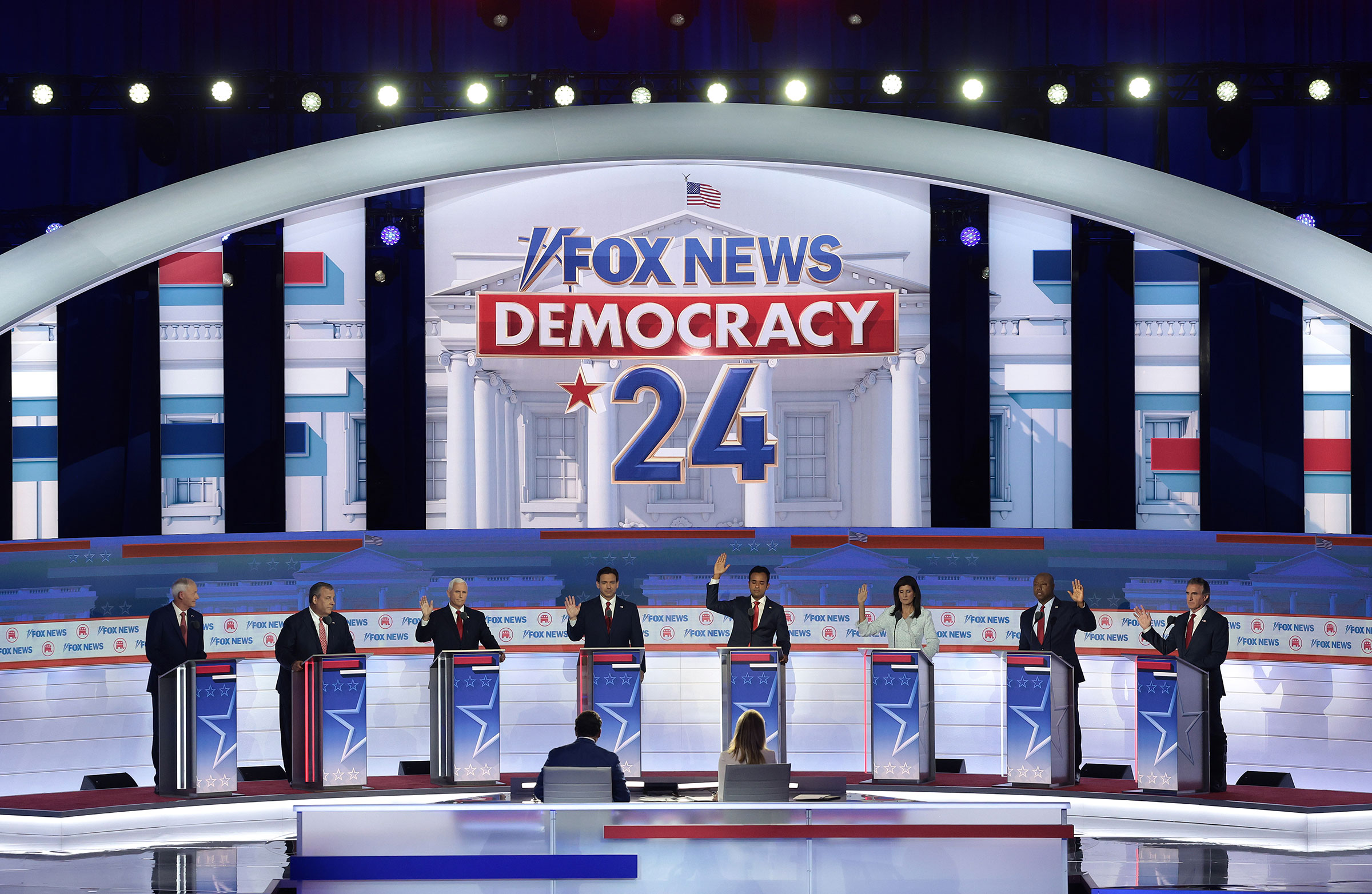
For nearly an hour, Republican presidential candidates at the first debate on Wednesday night largely managed to avoid talking about former President Donald Trump. But halfway through the debate, moderator Bret Baier said they had to address the “elephant not in the room” head-on.
He asked the eight candidates on stage to raise their hands if they would support Trump as the nominee even if he’s convicted of charges in any of his four criminal cases. Only Chris Christie and Asa Hutchinson, the former governors of New Jersey and Arkansas, did not raise their hands, even though all candidates had to sign a loyalty pledge agreeing to support the party’s eventual nominee, whoever it might be, in order to participate in the debate.
The discussion of Trump’s legal troubles and his influence within the Republican party marked one of the more dramatic moments of the night, eliciting audible reactions from the crowd and a fodder of intense on-stage exchanges. Trump, who skipped the debate, faces a cascade of legal troubles after becoming the first U.S. President to be indicted in the nation’s 234-year history. He has now been charged in four separate criminal cases related to his business and political activities, bringing his total criminal charges to date to 91.
“Someone has got to stop normalizing this conduct,” Christie said of Trump. “The conduct is beneath the office of president of the United States.” His response sparked an argument with Biotech entrepreneur Vivek Ramaswamy, who defended Trump and called him "the best president of the 21st century.”
More From TIME
Christie replied: “I’m not going to bow to anyone when we have a president of the United States who disrespects the Constitution. I will always stand up for the Constitution regardless of the political pressure.” Some in the crowd booed. Ramaswamy jumped in again: “Honest to God, your claim that Donald Trump is motivated by vengeance and grievance would be a lot more credible if your entire campaign wasn’t motivated by vengeance and grievance against one man.”
The heated exchange between the two candidates underscores how the criminal cases against Trump are expected to be at the forefront of the 2024 campaign. A recent New York Times/Siena College poll found that 71% of GOP primary voters think Republicans should stand behind Trump amid the investigations and indictments he’s facing.
The cases are expected to play out over the coming months, setting up a long string of legal battles that will overlap with next year’s presidential primaries. In New York, Trump faces 34 felony counts over allegations that he falsified business records to conceal hush-money payments to a porn star. He’s also facing 40 felony counts in Florida for allegedly hoarding classified documents and obstructing the government’s efforts to retrieve them, and four counts in Washington related to his alleged efforts to overturn the 2020 election. Most recently, the district attorney in Fulton County, Ga. charged Trump with 13 felony counts in connection to his alleged attempts to overturn the 2020 election result in that state.
Trump has cast the four separate indictments against him as a partisan witch-hunt to stop him from reclaiming the White House. In both the federal and Georgia cases that allege he knowingly spread lies of election fraud to stay in power, Trump’s attorneys have argued that he was acting within his First Amendment rights to challenge the election outcome. They also insist that Trump believed his own claims and was therefore not operating with criminal intent.
Trump’s rivals have so far been wary of directly attacking the former President, who remains the undisputed frontrunner in the crowded field. The latest FiveThirtyEight average of national polls shows Trump enjoys the support of just over half of Republican voters, followed by Florida Gov. Ron DeSantis in second at around 15%. But on the debate stage Wednesday night, some candidates decided to use the moment to blitz the absent frontrunner.
“We have to face the fact that Trump is the most disliked politician in America,” said Nikki Haley, a former U.N. ambassador in the Trump administration. “We can’t win a general election that way.”
The candidates were also asked whether former Vice President Mike Pence did the right thing on Jan. 6, 2021 by refusing Trump’s request to unilaterally reject the results of the 2020 presidential election—conduct at issue in Trump’s latest indictment. Pence has always maintained that he had no legal power as Vice President to reject the Electoral College votes in Congress. All of the candidates on the debate stage with him agreed.
“Absolutely,” said South Carolina Sen. Tim Scott, who was the first candidate to answer the question. DeSantis initially sidestepped the question, saying “It’s not about Jan. 6, 2021, it’s about Jan. 20, 2025.” He later clarified and said “Mike did his duty. I got no beef with him.”
“I’m relieved,” Pence quipped.
More Must-Reads from TIME
- Donald Trump Is TIME's 2024 Person of the Year
- TIME’s Top 10 Photos of 2024
- Why Gen Z Is Drinking Less
- The Best Movies About Cooking
- Why Is Anxiety Worse at Night?
- A Head-to-Toe Guide to Treating Dry Skin
- Why Street Cats Are Taking Over Urban Neighborhoods
- Column: Jimmy Carter’s Global Legacy Was Moral Clarity
Write to Nik Popli at nik.popli@time.com